March on Washington
CIVIL RIGHTS LEADER Ella Baker utilized the strength of her voice at the height of that movement to fundamentally question the notions and ideas of equality and leadership in this nation. In 1969, Baker said, “[T]he system under which we now exist has to be radically changed.” This means “facing a system that does not lend itself to your needs and devising means by which you change that system.”
Black women have long been considered the backbone for civil rights, social justice, church advancement, and animators of democracy in the United States. If this is so, then why are so many still overlooked for advancement in political power as well as the everyday jobs that they are more than qualified for?
While “women” won the right to vote in 1920, Black women fought for about another half century to exercise their right. The inequities of gender, race, and access are still with us — and there is no greater time than now to push hard for political and social advancement.
YOU, FAITHFUL CHURCH workers, have survived the demands of Lent, Holy Week, Easter, and Pentecost, and I’m willing to wager you are tired. By this time in the liturgical cycle, I’m usually exhausted and my spiritual (and sometimes physical) walk includes a pronounced limp. Vocational and social demands have taken their toll, not to mention the profound collective trauma we have all been through. Two years ago this summer, the waves of direct action in response to the police killings of Breonna Taylor and George Floyd left many of us particularly drained. And the shootings have not stopped. We have all done and been through so much.
Throughout the New Testament, the text refers to faith using the Greek word pistis. That word can also translate as faithfulness, a dogged determination that refuses to acquiesce or let anyone stifle it. It’s the same faith exercised by the woman with the flow of blood and shown in the litany of ancestors in Hebrews 11. It is more than sentimental, and sometimes is best exercised by simply being still and remembering who God is.
Our scriptures this month encourage us to exercise and examine our faith so that we keep going forward, even if we must stop and reset ourselves. Whether our posture is active or passive, our faith is still called into action because the world needs our witness.
Civil rights leader and long-time member of the U.S. House of Representatives John Lewis died on Friday at age 80 after a battle with pancreatic cancer.
Twenty years ago, men gathered as “Promise Keepers” and filled the National Mall for a prayer rally seeking repentance and spiritual revival. On Oct. 9, it was the women’s turn.
On the 54th anniversary of the “I Have a Dream” speech, the voice of Dr. Martin Luther King Jr. echoed across the lower end of the National Mall as thousands of clergy gathered in Washington, D.C., to march for racial justice. The Ministers March for Justice brought together faith leaders of many traditions to speak out against racism and white supremacy, and sought to call the government to accountability.

FILE PHOTO: Clergy and people of faith counter-protest a white supremacist rally Aug. 12 in Charlottesville. Photo by Heather Wilson (@aNomadPhotog) / Dust & Light Photo.
The “One Thousand Ministers March for Justice,” expected to proceed Monday from the Martin Luther King Jr. Memorial to the Justice Department, originally was planned to protest increased hate crimes, mass incarceration and discrimination and to call on the Trump administration and Attorney General Jeff Sessions to address those issues.

The Rev. Dr. Martin Luther King, Jr. at the March on Washington in 1963. Image via Rowland Scherman; restored by Adam Cuerden (U.S. National Archives and Records Administration)/Wikimedia Commons
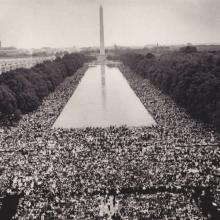
Image via Robert Joyce papers, 1952-1973 / flickr.com
The Bahá'í writings say that human beings are like mines rich in gems of inestimable value and that one of the purposes of this earthly life is to discover our God-given gems, polish them, and bring them out to serve humanity. Today I write about a wonderful woman who has offered her many incredible gems in service.
We learned about sit-ins, bus boycotts, Martin Luther King, and Malcolm X. But when it came to the Black Panthers, I was taught virtually nothing. I can vaguely recall a high school teacher mentioning Huey Newton, and showing photos of John Carlos and Tommie Smith giving the Black Power salute at the 1968 Olympics. That’s it.
We didn’t hear about the origins of the Black Panthers, or their active improvement of local communities. We didn’t hear about the personalities that created both important exposure and also infighting. We didn’t hear the story of the federal government’s fear of the Panthers or its insidious undercover missions, whose implementation prompted senseless killing and violent responses.
What we didn’t hear, in short, is everything The Black Panthers: Vanguard of the Revolution covers.
They were among the youngest martyrs of the civil rights movement, four young black girls — three 14-year-olds and one 11-year-old — whose deaths in a church basement horrified a nation already torn apart by segregation.
This week, 50 years after the Ku Klux Klan bombing at Sixteenth Street Baptist Church in Birmingham, Ala., shook hopes for a colorblind country, the four girls are getting their due.
Addie Mae Collins, Cynthia Wesley, Carole Robertson and Denise McNair were posthumously awarded the Congressional Gold Medal on Tuesday (Sept. 10), a day after a piece of shattered stained glass from the church was donated to the Smithsonian.
Yesterday’s “Let Freedom Ring” ceremony in Washington, D.C., honored the nation's substantial advances in racial equality in the fifty years since Dr. Martin Luther King, Jr. delivered his now-iconic “I Have a Dream” speech.
But events this year — from the Supreme Court gutting the Voting Rights Act to the House eliminating funding for food stamps to the Trayvon Martin trial — are posing serious challenges to our national progress towards true equality for all.
An infographic from the Public Religion Research Institute, "The Dream by the Numbers," highlights systemic inequalities that still work against communities of color today. The statistics are grim: black communities are unemployed at nearly double the rate of white communities. Fewer than 20 percent of black youth will receive a college or graduate degree. Twice as many blacks lack health insurance as whites. And nearly 70 percent of blacks surveyed mentioned “lack of opportunities for young people” as a top concern for their community.
Yesterday was the 50th anniversary of a day that changed America, changed the world, and changed my life forever. I was fourteen years old on Aug. 28, 1963, in my very white neighborhood, school, church, and world. But I was watching. The Rev. Dr. Martin Luther King, Jr., became a founding father of this nation on that day, so clearly articulating how this union could become more perfect.
He didn’t say, “I have a complaint.” Instead, he proclaimed (and a proclamation it was in the prophetic biblical tradition), “I have a dream.” There was much to complain about for black Americans, and there is much to complain about today for many in this nation. But King taught us that day our complaints or critiques, or even our dissent will never be the foundation of social movements that change the world — but dreams always will. Just saying what is wrong will never be enough the change the world. You have to lift up a vision of what is right.
The dream was more than the Civil Rights Act and the Voting Rights Act, which both followed in the years after the history-changing 1963 March on Washington for Jobs and Freedom. It finally was about King’s vision for “the beloved community,” drawn right from the heart of his Christian faith and a spiritual foundation for the ancient idea of the common good, which we today need so deeply to restore.
WASHINGTON — Fifty years to the day after Martin Luther King, Jr., knocked on the nation’s conscience with his dream, religious leaders gathered in a historic church to remind the nation that he was fueled by faith.
Later, in the shadow of the Lincoln Memorial where King thundered about America’s unmet promises, King’s children joined the likes of President Barack Obama and Oprah Winfrey to rekindle what Obama called a “coalition of conscience.”
At Shiloh Baptist Church, where King preached three years before his 1963 “I Have A Dream” speech, Christian, Jewish, Muslim, and Sikh clergy summoned King’s prophetic spirit to help reignite the religious fires of the civil rights movement.
King’s daughter, the Rev. Bernice A. King, said at the service that her father was a freedom fighter and a civil rights leader, but his essence was something else.
“He was a pastor,” said King, who was 5 when her father electrified the nation in front of the Lincoln Memorial. “He was a prophet. He was a faith leader.”
Editor's Note: The following is a transcript of President Barack Obama's speech from the Lincoln Memorial on the 50th Anniversary of the March on Washington.
We rightly and best remember Dr. King’s soaring oratory that day, how he gave mighty voice to the quiet hopes of millions; how he offered a salvation path for oppressed and oppressors alike. His words belong to the ages, possessing a power and prophecy unmatched in our time.
But we would do well to recall that day itself also belonged to those ordinary people whose names never appeared in the history books, never got on TV. Many had gone to segregated schools and sat at segregated lunch counters. They lived in towns where they couldn’t vote and cities where their votes didn’t matter. They were couples in love who couldn’t marry, soldiers who fought for freedom abroad that they found denied to them at home. They had seen loved ones beaten, and children fire-hosed, and they had every reason to lash out in anger, or resign themselves to a bitter fate.
We’ve spent the last few days recalling the anniversary of the March on Washington and listening again to the Rev. Martin Luther King, Jr., talk so powerfully about his dream of a land that is full of love and free of hatred. Stirring words. Inspiring words. Spirit-infused words. We’re also reminded that they’re only words until they produce action.
It’s one thing to be inspired when we hear something, another thing to respond to the inspiration and to do something.
Powerful words play a big role in our lives, challenging us and leading us. God is love. Love one another. Be compassionate. Love your enemies. Whatsoever you do to the least. Your brother‘s keeper. An instrument of your peace. Give to all. The moral arc of the universe is long, but it bends toward justice. Blessed are the poor. All men are created equal. The common good. Government of, by and for the people. I have a dream. Be the change. Make justice a reality for all God‘s children.
Those and so many other words inspire us to raise our lives and our world to new heights. But they remain words until we commit ourselves to live them. Then they acquire real power.
It may be the most famous speech of the 20th century.
Millions of American schoolchildren who never experienced Jim Crow or whites-only water fountains know the phrase “I have a dream.”
And many American adults can recite from memory certain phrases: the Rev. Martin Luther King Jr.’s use of the prophet Amos’ vision of justice rolling down “like waters and righteousness like a mighty stream,” or the line about children being judged not by “the color of their skin but the content of their character.”
To many in this country, “I have a dream” has a place of honor next to the Declaration of Independence, the Emancipation Proclamation and the Gettysburg Address. It celebrates the lofty ideals of freedom.
But scholars say it would be a mistake to celebrate the speech without also acknowledging its profound critique of American values.
Don Cash had graduated from high school in June 1963 and decided on the spur of the moment to join the March on Washington when he finished his work shift at a nearby warehouse. The Baptist layman is the president of the United Food and Commercial Workers Union’s Minority Coalition and a board member of the Southern Christian Leadership Conference and the NAACP.
“I think we got a long ways to go but I do think that there’s been a lot of changes. I don’t think you’ll ever see what Martin Luther King dreamed in reality, in total. I think we’ll always have to strive for perfection. The dream that he had is a perfect world and I think that in order to be perfect, you have to continue to work at it.”
The upcoming March on Washington has been on my mind as I reflect upon this week’s Gospel reading from Luke about a banquet. I personally love banquets. You get to adorn yourself with the finest trappings, dance the night away, and if the food is good, that is an added plus! But what I find most frustrating? Knowing a banquet is occurring, and I have not been invited. “Did I do something wrong? Do I not meet a certain standard? Who did get invited?” My wondering is filled with emotion.
What if America was a banquet, and at this banquet the servings were fair wages, just trials, civil rights and liberties, but offered by invitation only? According to those who “March(ed) on Washington,” this was exactly the case. Blacks deserved the same fair treatment as whites, and they were protesting to bring about the necessary changes. Perhaps if everyone took heed of Jesus’ instructions on banquet etiquette, things would be different and better.
I will march on Saturday because I refuse to allow my two sons to be treated as statistics or a stereotypes rather than as children of God. I will march because overly aggressive policing tactics that overly rely upon racial profiling make a mockery of Dr. King’s dream that every child will be judged by the content of their character and not the color of their skin.
I will march because the recent repeal of section four of the Voting Rights Act by the Supreme Court jeopardizes the voting rights of millions of Americans across the country, particularly in southern states where new barriers to this sacred right are already being erected.
I will march because based on national statistics, my two black boys face a one in three chance of spending some time of their lives behind bars, a disturbing and destructive reality that has been made possible in part by mandatory drug sentencing laws that must be reevaluated and changed.
Even with the scores of marches on Washington since 1963, we all still know what we mean when we say the March on Washington.
In our collective memory, we see black-and-white images of immaculately dressed men and women wearing hats, ties, and dresses, marching in dress shoes. We see a sea of people stretching from the Lincoln Memorial to the Washington Monument. And we see Dr. Martin Luther King, Jr., frozen in time, smiling and waving to the crowd of a quarter million people. We see King’s passion, mouth open as he bellows words that sear the conscience of a nation and ignite its imagination. His arm is outstretched over the podium. He is surrounded by men and women who are also there to plead with a nation to “let freedom ring!”
These images are seared into our nation’s memory, even though most of us were not there.







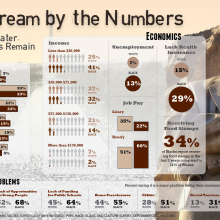
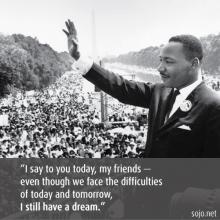
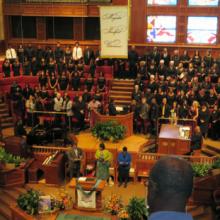
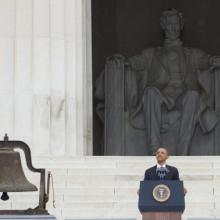
![President Lyndon Johnson and Martin Luther King, Jr. By Yoichi R. Okamoto [Public domain], via Wikimedia Commons By Yoichi R. Okamoto [Public domain], via Wikimedia Commons](https://sojo.net/sites/default/files/styles/medium_square/public/blog/512px-Lyndon_Johnson_and_Martin_Luther_King%2C_Jr._-_Voting_Rights_Act.jpg?itok=z3qvpwpZ)
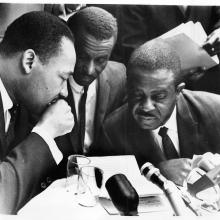


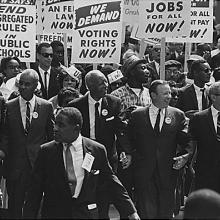
![By U.S. Information Agency, Press and Publications Service. [Public domain], via Wikimedia Commons [Public domain], via Wikimedia Commons](https://sojo.net/sites/default/files/styles/medium_square/public/blog/View_of_Crowd_at_1963_March_on_Washington.jpg?itok=ZBHysTcm)